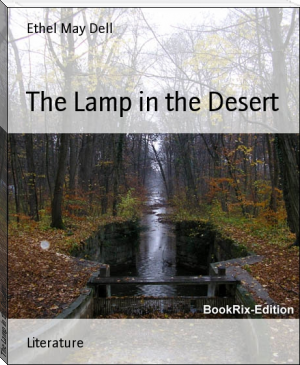The Odds by Ethel May Dell (best time to read books TXT) 📖

- Author: Ethel May Dell
Book online «The Odds by Ethel May Dell (best time to read books TXT) 📖». Author Ethel May Dell
"I believe you're in love with Culver's half-breed American," said Cosmo Fletcher brutally, nearly three weeks later. He had just been rejected finally and emphatically by the girl who faced him in the stern of his skiff.
She was very pale, but her eyes were full of resolution as they met his.
"That," she said, "is no business of yours. Please take me back!"
He looked as if he would have liked to refuse, but her steadfast eyes compelled him. Sullenly he turned the boat.
Dead silence reigned between them till, as they rounded a bend in the river and came within sight of the house-boat, Fletcher, glancing over his shoulder, caught sight of a big figure seated on the deck.
Then he turned to the girl with a sneer:
"It might interest Jack Merrivale to hear of this pretty little romance of yours," he said.
The colour flamed in her cheeks.
"Tell him then!" she said defiantly.
"I think I must," said Fletcher. "He and I are such old friends."
He waited for her to tell him that it was on his account that they had quarrelled, but she would not so far gratify him, maintaining a stubborn silence till they drew alongside. Jacques rose to hand her on board.
"I hope you have enjoyed your row," he said courteously.
"Thanks!" she returned briefly, avoiding his eyes. "I think it is too hot to enjoy anything to-day."
The tea-kettle was singing merrily on the dainty brass spirit-lamp, and she sat down at the table forthwith.
Jacques stood beside her, silent and friendly as a tame mastiff. Perhaps his presence after what had just passed between herself and Fletcher made her nervous, or perhaps her thoughts were elsewhere and she forgot to be cautious. Whatever the cause, she took up the kettle carelessly and knocked it against the spirit-lamp with some force.
Jacques swooped forward and steadied it before it could overturn; but the dodging flame caught the girl's muslin sleeve and set it ablaze in an instant. She uttered a cry and started up with a wild idea of flinging herself into the river, but Jacques was too quick for her. He turned and seized the burning fabric in his great hands, ripping it away from her arm and crushing out the flames with unflinching strength.
"Don't be frightened!" he said. "It's all right. I've got it out."
"And what of you?" she gasped, eyes of horror on his blackened hands.
He smiled at her reassuringly.
"Well done, man!" cried Dick Culver. "It was like you to save her life while we were thinking about it. Are you hurt, Hilary?"
"No," she said, with trembling lips. "But--but--"
She broke off on the verge of tears, and Dick considerately transferred his attention to his friend.
"Let's see the damage, old fellow!"
"It is nothing," said Jacques, still faintly smiling. "Yes, you may see it if you like, if only to prove that I speak the truth."
He thrust out one hand and displayed a scorched and blistered palm.
"Call that nothing!" began Dick.
Fletcher suddenly pushed forward with an oath that startled them all.
"I should know that hand anywhere!" he exclaimed. "You infernal, lying impostor!"
There was an elaborate tattoo of the American flag on the extended wrist, to which he pointed with a furious laugh.
"Deny it if you can!" he said.
Jacques looked at him gravely, without the smallest sign of agitation.
"You certainly have good reason to know that hand rather well," he said after a moment, speaking with extreme deliberation, "considering that it has had the privilege of giving you the finest thrashing of your life."
Fletcher turned purple. He looked as if he were going to strike the speaker on the mouth. But before he could raise his hand Hilary suddenly forced herself between them.
"Mr. Fletcher," she said, her voice quivering with anger, "go instantly! There is your boat. And never come near us again!"
Fletcher fell back a step, but he was too furious to obey such a command.
"Do you think I am going to leave that confounded humbug to have it all his own way?" he snarled. "I tell you--"
But here Culver intervened.
"You shut up!" he ordered sternly. "We've had too much of you already. You had better go."
He took Fletcher imperatively by the arm, but Jacques intervened.
"Pray let the gentleman speak, Dick!" he said. "It will ease his feelings perhaps."
"No!" broke in Hilary breathlessly. "No, no! I won't listen! I tell you I won't!" facing the big man almost fiercely. "Tell me yourself if you like!"
He looked at her closely, still with that odd half-smile upon his face.
Then, before them all, he took her hand, and, bending, held it to his lips.
"Thank you, Hilary!" he said very softly.
In the privacy of her own cabin Hilary removed her tatters and cooled her tingling cheeks. She and her brother were engaged to dine at Dick's bungalow that night, but an overwhelming shyness possessed her, and at the last moment she persuaded Bertie to go alone. It was plain that for some reason Bertie was hugely amused, and she thought it rather heartless of him.
She dined alone on the house-boat with her face to the river. Her fright had made her somewhat nervous, and she was inclined to start at every sound. When the meal was over she went up to her favourite retreat on the upper deck. A golden twilight still lingered in the air, and the river was mysteriously calm. But the girl's heart was full of a heavy restlessness. Each time she heard a punt-pole striking on the bed of the river she raised her head to look.
He came at last--the man for whom her heart waited. He was punting rapidly down-stream, and she could not see his face. Yet she knew him, by the swing of his arms, the goodly strength of his muscles,--and by the suffocating beating of her heart. She saw that one hand was bandaged, and a passionate feeling that was almost rapture thrilled through and through her at the sight. Then he shot beyond her vision, and she heard the punt bump against the house-boat.
"It's a gentleman to see you, miss," said the Badger, thrusting a grey and grinning visage up the stairs.
"Ask him to come up!" said Hilary, steadying her voice with an effort.
A moment later she rose to receive the man she loved. And her heart suddenly ceased to beat.
"You!" she gasped, in a choked whisper.
He came straight forward. The last light of the day shone on his smooth brown face, with its steady eyes and strong mouth.
"Yes," he said, and still through his quiet tones she seemed to hear a faint echo of the subdued twang which dwellers in the Far West sometimes acquire. "I, John Merrivale, late of California, beg to render to you, Hilary St. Orme, in addition to my respectful homage, that freedom for which you have not deigned to ask."
She stared at him dumbly, one hand pressed against her breast. The ripple of the river ran softly through the silence. Slowly at last Merrivale turned to go.
And then sharply, uncertainly, she spoke.
"Wait, please!" she said.
She moved close to him and laid her hand on the flower-bedecked balustrade, trembling very much.
"Why have you done this?" Her quivering voice sounded like a prayer.
He hesitated, then answered her quietly through the gloom.
"I did it because I loved you."
"And what did you hope to gain by it?" breathed Hilary.
He did not answer, and she drew a little nearer as though his silence reassured her.
"Wouldn't it have saved a lot of trouble," she said, her voice very low but no longer uncertain, "if you had given me my freedom in the first place? Don't you think you ought to have done that?"
"I don't know," Merrivale said. "That fellow spoilt my game. So I offer it to you now--with apologies."
"I should have appreciated it--in the first place," said Hilary, and suddenly there was a ripple of laughter in her voice like an echo of the water below them. "But now I--I--have no use for it. It's too late. Do you know, Jack, I'm not sure he did spoil your game after all!"
He turned towards her swiftly, and she thrust out her hands to him with a quick sob that became a laugh as she felt his arms about her.
"You hairless monster!" she said. "What woman ever wanted freedom when she could have--Love?"
* * * * *
Two days later Viscount Merrivale's friends at the club read with interest and some amusement the announcement that his marriage to Miss Hilary St. Orme had been fixed to take place on the last day of the month.
* * * * *
Death's Property
CHAPTER I
A high laugh rang with a note of childlike merriment from the far end of the coffee-room as Bernard Merefleet, who was generally considered a bear on account of his retiring disposition, entered and took his seat near the door. It was a decidedly infectious laugh and perhaps for this reason it was the first detail to catch his attention and to excite his disapproval.
He frowned as he glanced at the menu in front of him.
He had arrived in England after an absence of twenty years in America, where he had made a huge fortune. He was hungering for the quiet unhurried speech of his fellow-countrymen, for the sights and sounds and general atmosphere of English life which for so long had been denied to him. And the first thing he heard on entering the coffee-room of this English hotel was the laugh of an American woman.
He had thought that in this remote corner of England--this little, old-world fishing town, with its total lack of entertainment, its unfashionable beach, and its wild North Sea breakers--no unit of the great Western race would have set foot. He had believed its entire absence of attraction to be a sure safeguard, and he was unfeignedly disgusted to discover that this was not the case.
As he ate his dinner the high laugh broke in on his meditations again and again, and his annoyance grew to a sense of savage irritation. He had come over to England for a rest after a severe illness, and with an intense craving, after his twenty years of stress and toil, to stand aside and watch the world--the English, conservative world he loved--dawdle by.
He wanted to bury himself in an unknown fishing-town and associate with the simple, unflurried fisher-folk alone. It was a dream of his--a dream which he had imagined near its fulfilment when he had arrived in the peaceful little world of Old Silverstrand.
There was a large and fashionable watering-place five miles away. This was New Silverstrand, a town of red brick, self-centred and prosperous. But he had not thought that its visitors would have overflowed into the old fishing-town. He himself saw no attraction there save the peace of the shore and the turmoil of the sea. He had known and loved the old town in his youth, long before the new one had been built or even thought of. For New Silverstrand was a growth of barely ten years.
In all his
 Have you ever thought about what fiction is? Probably, such a question may seem surprising: and so everything is clear. Every person throughout his life has to repeatedly create the works he needs for specific purposes - statements, autobiographies, dictations - using not gypsum or clay, not musical notes, not paints, but just a word. At the same time, almost every person will be very surprised if he is told that he thereby created a work of fiction, which is very different from visual art, music and sculpture making. However, everyone understands that a student's essay or dictation is fundamentally different from novels, short stories, news that are created by professional writers. In the works of professionals there is the most important difference - excogitation. But, oddly enough, in a school literature course, you don’t realize the full power of fiction. So using our website in your free time discover fiction for yourself.
Have you ever thought about what fiction is? Probably, such a question may seem surprising: and so everything is clear. Every person throughout his life has to repeatedly create the works he needs for specific purposes - statements, autobiographies, dictations - using not gypsum or clay, not musical notes, not paints, but just a word. At the same time, almost every person will be very surprised if he is told that he thereby created a work of fiction, which is very different from visual art, music and sculpture making. However, everyone understands that a student's essay or dictation is fundamentally different from novels, short stories, news that are created by professional writers. In the works of professionals there is the most important difference - excogitation. But, oddly enough, in a school literature course, you don’t realize the full power of fiction. So using our website in your free time discover fiction for yourself. 




Comments (0)